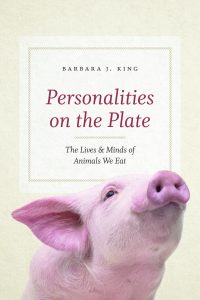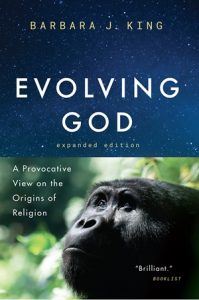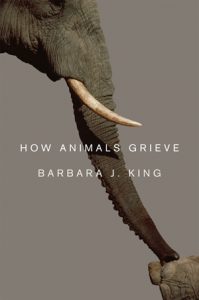7 questions for Barbara J. King, author of How Animals Grieve

Anthropology professor and science writer Barbara J. King has been writing about animals—and pushing the boundaries of what we know and can say about their minds and emotions—for years now. Chicago has been proud to share those discoveries through the books Personalities on the Plate: The Lives and Minds of Animals We Eat, How Animals Grieve, and Evolving God: A Provocative View on the Origins of Religion, all of which have found enthusiastic audiences of both general readers and scholars. Knowing that Barbara was deep into work on her next book (and could probably use a distraction!), we send her a fewquestions.

It’s been a year since we published Personalities on the Plate, so I’ll ask that most-dreaded question: what are you working on right now?
My writing life works best if I trade off among three speeds at once: banging out a short book review for NPR, the Washington Post, or the Times Literary Supplement; crafting a magazine-length piece that requires more in-depth research; and plugging away at a book manuscript. I’m pretty much always in the middle of three writing projects, as a result. The book project that very much preoccupies me now–for Chicago, as you know—plunges me into thorny issues related to acting with empathy for animals. Specifically, how can we make the lives better of animals who live in the wild, in zoos, in science laboratories, and in our homes (including our kitchens)? The answers, I’m discovering as I write, aren’t as straightforward as one might think.
Any surprises you can share with us from the research and writing for that project, to whet our appetite?
In our house we have for years rescued spiders by trapping them in a glass and ushering them outdoors. I was a little bit proud of this act of empathy, which I did think to be straightforward. Well, in doing research for the book, I came across this sentence in Dr. Eleanor’s Book of Common Spiders: “Remember, many spiders found in our homes are actually in their preferred habitat already.” This was a jolt! I’m always talking about how our species should curb rampant encroachment into the habitats of orangutans and octopus, snakes and shorebirds, yet I hadn’t stopped to think that the tiniest animals in my home may also be AT HOME right here. What emerged from this is a really fun section I’ve written on the latest research into spider cognition—the discovery that orb-web spiders can count, for instance! It’s easier to act with empathy towards animals, I think, whose minds we understand, at least a little.
 You were part of a panel at the World Science Festival this spring that was related to your earlier book Evolving God.
You were part of a panel at the World Science Festival this spring that was related to your earlier book Evolving God.
What did you take away from that experience?
That being part of a fast-moving conversation among five scientists in front of harsh stage lights to a sold-out audience can be a wild experience! I was thrilled to join with physicist Brian Greene (the festival’s cofounder) and psychologists Steven Pinker, Lisa Feldman Barrett, and Zoran Josipovic in discussing the role of belief in human culture over the eons. Brian, as moderator, gave us some idea ahead of time of what we’d each be asked, but in the best way of rapidly unfolding and highly contingent primate communication, our conversation was unscripted and unfettered. We veered from the spiritual meaning of Neanderthal burials to the evolutionary reasons why human minds today—globally speaking, even despite greater secularization—are still so prepared to assign agency to God, gods, or spirits.
Your book How Animals Grieve continues to be cited regularly in both scholarly and general media, and you’ve become a go-to voice on the subject. Can you detect any change in the general public thinking about this topic in the years since you published it? What about within the sciences?
Just out is a special issue of a journal, Philosophical Transactions of the Royal Society B—Biological Sciences, devoted to what the editors call “evolutionary thanatology”—that is, to a cross-disciplinary study of responses to death, including animal grief. It’s fascinating to see now how many animals are now known to mourn when their companions die. In other cases, survivor animals carry out behaviors around bodies—of exploration, display, or protection maybe—that we don’t entirely understand. This whole field is exploding among field scientists and has an amazing future because patterns are beginning to emerge from the accumulating database. As for the general public, in my view, most folks who live with animals “got it” way before most scientists did, accepting the reality of animal emotions. I still routinely hear from people who describe for me—with entirely credible evidence often supplemented by photographs or videos–animals who grieve, ranging from donkeys to squirrels to companion animals and birds.
 So . . . how many animals do you actually have living with you these days? (I just know it’s a lot!)
So . . . how many animals do you actually have living with you these days? (I just know it’s a lot!)
Five cats live indoors with us and six more in our yard’s outdoor enclosure for rescued semi-ferals. Cat number twelve is a semi-feral male who stubbornly refuses enclosure but hangs out near our house. This cat, we have just discovered, developed diabetes–highly unusual in a thin outdoor cat–so my husband gives him insulin injections daily, which takes skill. Of course, this even-dozen census doesn’t include the wild animals we welcome to our yard, rabbits, turtles. groundhogs, deer, the occasional fox and coyote, hummingbirds, mockingbirds, and, back in the house, the spiders and other tiny animals with whom we co-habit (see question 2!)
What’s the most interesting animal-related news story you’ve encountered lately?
Earlier this month, the worldwide media reported on a court decree from the state of Uttarakhand in northern India: all animals there, aquatic, avian, and land, are now deemed legal persons. Here in the United States I have long been a fan of the Nonhuman Rights Project’s legal cases in support of personhood for chimpanzees, but this Indian case took me by surprise. Two colleagues sent me the actual legal document from the court, letting me know that How Animals Grieve was cited in it, in support of the decree. I was very moved by this. Questions are still to be worked out, yes, about the meaning of personhood status for animals other than humans, but the goals are to move away from a system in which animals are mere property, and to fight animal cruelty.
What’s the best book you’ve read lately? Actually, let’s make this a two-parter, because I know from years of working with you that you are voracious and catholic reader: what’s the best book you’ve read lately that could be considered within your field, and what’s the best one outside of it?
I’m quite into contemporary fiction, and lately, Japanese fiction. It all started with Haruki Murakami and Kazuo Ishiguro, then I began to experiment: writers like Banana Yoshimoto (Moshi Moshi, for instance) and Yasunari Kawabata (Snow Country) delight me. Writers of Africa, too: Gael Faye’s Small Country and Uzodinma Iweala’s Speak No Evil both broke open my heart recently. (I’ve violated the terms of your question, I know!) In my own field of animal behavior and ethics, I just reviewed Ben Goldfarb’s nonfiction book Eager, and deployed a word I use sparingly: “Masterpiece.” Goldfarb writes in a captivating way about the behavior of beavers and the capacity beavers have (if we would only let them) to transform our troubled landscapes by storing carbon and restoring wetlands. Next I want to read Joel Berger’s Extreme Conservation, because I’ve enjoyed Berger’s work so much in the past. My “to read” pile is a tower, and I wouldn’t have it any other way.
To learn more about Barbara’s work and interests, check out her website and follow her on Twitter, where she regularly shares interesting stories of animals—and the occasional tip about a good book!
(Author photo credit: Stephen Salpukas/College of William & Mary)